
Maria do Carmo Miranda da Cunha, known professionally as Carmen Miranda, was a Portuguese-born Brazilian singer. Nicknamed "The Brazilian Bombshell", she was known for her signature fruit hat outfit that she wore in her American films.
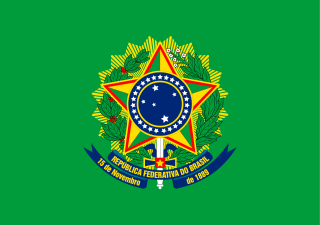
The president of Brazil, officially the president of the Federative Republic of Brazil or simply the President of the Republic, is the head of state and head of government of Brazil. The president leads the executive branch of the federal government and is the commander-in-chief of the Brazilian Armed Forces.
The Brazilian Institute of Geography and Statistics is the agency responsible for official collection of statistical, geographic, cartographic, geodetic and environmental information in Brazil. IBGE performs a decennial national census; questionnaires account for information such as age, household income, literacy, education, occupation and hygiene levels.

A quilombo is a Brazilian hinterland settlement founded by people of African origin, and others sometimes called Carabali. Most of the inhabitants of quilombos, called quilombolas, were maroons, a term for escaped slaves.

Luiz Gonzaga do Nascimento was a Brazilian singer, songwriter, musician and poet and one of the most influential figures of Brazilian popular music in the twentieth century. He has been credited with having presented the rich universe of Northeastern musical genres to all of Brazil, having popularized the musical genre baião and has been called a "revolutionary" by Antônio Carlos Jobim. According to Caetano Veloso, he was the first significant cultural event with mass appeal in Brazil. Luiz Gonzaga received the Shell prize for Brazilian Popular Music in 1984 and was only the fourth artist to receive this prize after Pixinguinha, Antônio Carlos Jobim and Dorival Caymmi. The Luiz Gonzaga Dam was named in his honor.
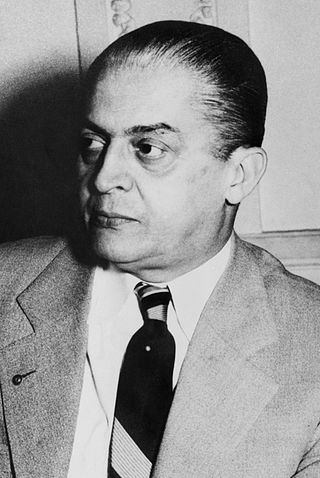
Carlos Coimbra da Luz was a Brazilian politician, lawyer, teacher and journalist who served as acting president of Brazil from November 8 to November 11, 1955.

Aurélio Buarque de Holanda Ferreira was a Brazilian lexicographer, philologist, translator, and writer, best known for editing the Novo Dicionário da Língua Portuguesa, a major dictionary of the Portuguese language.

Manuel Carneiro de Sousa Bandeira Filho was a Brazilian poet, literary critic, and translator, who wrote over 20 books of poetry and prose.
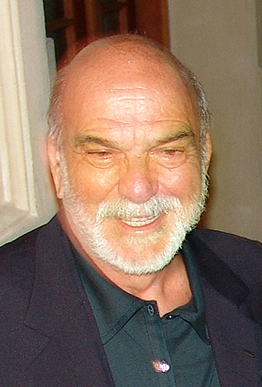
Ariclenes Venâncio Martins, known professionally as Lima Duarte, is a Brazilian actor. He played a number of characters in Brazilian telenovelas, such as Zeca Diabo in O Bem-Amado and Sinhozinho Malta in Roque Santeiro. He first appeared on Brazilian television in 1950. Duarte also worked as a voice actor in the 1960s, being the voice of Top Cat, Wally Gator and Dum-Dum. He has worked with Brazilian and Portuguese directors, such as Fábio Barreto, Paulo Rocha and Manoel de Oliveira.

The Treaty of Petrópolis, signed on November 17, 1903, in the Brazilian city of Petrópolis, ended the Acre War between Bolivia and Brazil over the then-Bolivian territory of Acre, a desirable territory in Bolivia-Brazil border during the contemporary rubber boom.

Ariano Vilar Suassuna was a Brazilian playwright and author. He was the driving force behind the creation of the Movimento Armorial. He founded the Student Theater at Federal University of Pernambuco. Four of his plays have been filmed, and he was considered one of Brazil's greatest living playwrights of his time. He was also an important regional writer, doing various novels set in the Northeast of Brazil. He received an honorary doctorate at a ceremony performed at a circus. He was the author of, among other works, the Auto da Compadecida and A Pedra do Reino. He was a staunch defender of the culture of the Northeast, and his works dealt with the popular culture of the Northeast.

Maria Della Costa was a Brazilian theater, movie and TV actress and producer.
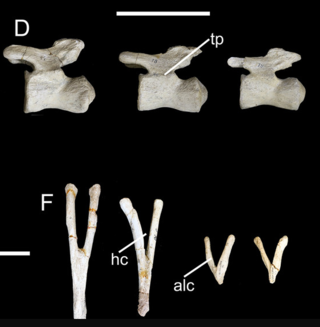
Baurutitan is a genus of sauropod dinosaur that lived during the Late Cretaceous in what is now Brazil. The type species, Baurutitan britoi, was described in 2005 by Kellner and colleagues, although the fossil remains had already been discovered in 1957. Baurutitan is classified as a lithostrotian titanosaur, and is distinguished from related genera based on its distinctive caudal vertebrae. This South American dinosaur was found in the Serra da Galga Formation near Uberaba, in the Brazilian state of Minas Gerais.

Flávio Rodrigues da Costa was a Brazilian football player and manager. He managed the Rio de Janeiro clubs Vasco da Gama and Flamengo, as well as Colo Colo of Chile, and FC Porto of Portugal.
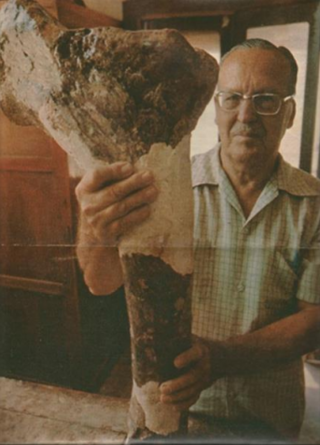
Llewellyn Ivor Price was one of the first Brazilian paleontologists. His work contributed not only to the development of Brazilian but also to global paleontology. He collected Staurikosaurus in 1936, the first dinosaur discovered in Brazil.

The history of ethanol fuel in Brazil dates from the 1970s and relates to Brazil's sugarcane-based ethanol fuel program, which allowed the country to become the world's second largest producer of ethanol, and the world's largest exporter. Several important political and technological developments led Brazil to become the world leader in the sustainable use of bioethanol, and a policy model for other developing countries in the tropical zone of Latin America, the Caribbean, and Africa. Government policies and technological advances also allowed the country to achieve a landmark in ethanol consumption, when ethanol retail sales surpassed 50% market share of the gasoline-powered vehicle fleet in early 2008. This level of ethanol fuel consumption had only been reached in Brazil once before, at the peak of the Pró-Álcool Program near the end of the 1980s.

Peirosaurus is an extinct genus of peirosaurid crocodylomorph known from the Late Cretaceous period of Minas Gerais, southern Brazil. It contains a single species, Peirosaurus torminni. It is the type genus of the family Peirosauridae.

Events in the year 1955 in Brazil.

From mid-2014 onward, Brazil experienced a severe economic crisis. The country's Gross Domestic Product (GDP) fell by 3.5% in 2015 and 3.3% in 2016, after which a small economic recovery began. That recovery continued until 2020, when the COVID-19 pandemic began to impact the economy again.
Sheila Maureen Bisilliat is an English-born Brazilian photographer.



















